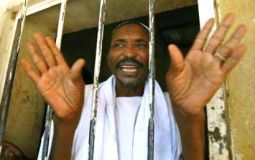Sudanese govt will prosecute 164 people for rights abuses in Darfur
By MOHAMED OSMAN, Associated Press Writer
KHARTOUM, Sudan, Mar 29, 2005 (AP) — One hundred and sixty-four people, including civil servants, will stand trial in Sudan for abuses in Darfur, the government has said, as the U.N. Security Council prepares to vote on prosecuting criminals from the western Sudan conflict in an international court.

|
|
Hadj Suleiman, one of six arrested Sudanese men, shouts from a cell inside the court in Nyala, September 30, 2004. (Reuters). |
Sudan has repeatedly said it wouldn’t accept international trials for people accused of atrocities in the Darfur conflict. Foreign Minister Mustafa Osman Ismail reiterated on state television Tuesday: “We will never hand over any Sudanese national – whether he is an outlaw, an army officer or a government official – for trial outside Sudan .”
The U.N. Security Council is scheduled to vote Wednesday on a draft resolution that would empower the International Criminal Court to prosecute violators of human rights in Darfur, where a two-year rebellion and counter-insurgency has led to the death of an estimated 180,000 people and the displacement of about 2 million residents.
The resolution, proposed by France, may not pass as the U.S. opposes the International Criminal Court and prefers that Darfur suspects stand trial in a court to be set up by the African Union and the U.N.
“We will do our level best to stop such a resolution from being adopted,” Foreign Minister Osman told a morning talk show.
The head of a Sudanese investigation committee into abuses in Darfur, Judge Mohammed Abdul Raheem, said the government will prosecute 150 alleged perpetrators in North Darfur and 14 in South Darfur, the official Sudan News Agency reported Monday.
“All those persons, including some persons working with the government, will stand fair trial,” Abdul Raheem told the agency. His committee was set up by presidential decree after foreign governments and the United Nations accused Sudan of failing to stop atrocities in Darfur.
Sudan argues it is capable of bringing to justice those responsible for rights abuses in Darfur. But the world does not accept this, partly because a U.N. panel that investigated the conflict found the government itself was implicated in mass killings in Darfur.
In a report issued in February, the U.N. commission recommended that 51 Sudanese – including high-ranking government officials – stand trial in the International Criminal Court.
It was only in October last year, 20 months after the conflict began, that Sudanese courts first convicted a leader of the Janjaweed, the pro-government militia accused of conducting an ethnic cleansing campaign in Darfur. Mohammed Barbary Ahab el-Nabi, an Awalad Zeid tribal leader, was sentenced to three years in jail and fined the equivalent of $39,000 for arson and stealing cattle.
The conflict began in February 2003 when rebels took up arms against what they saw as years of state neglect and discrimination against Sudanese of African origin. The government is accused of responding with a counterinsurgency campaign in which the Janjaweed, an Arab militia, committed wide-scale abuses against the African population.
